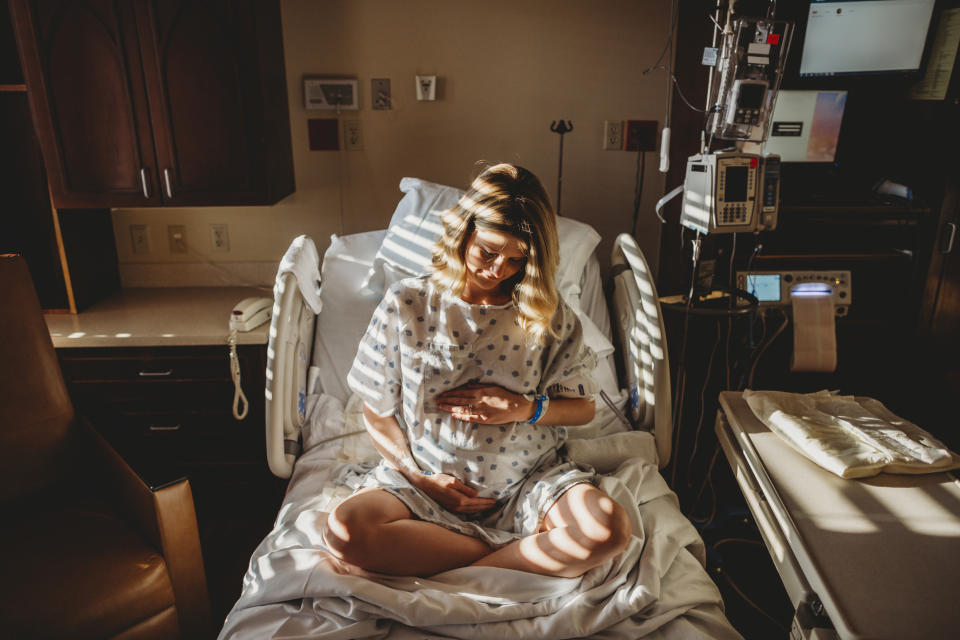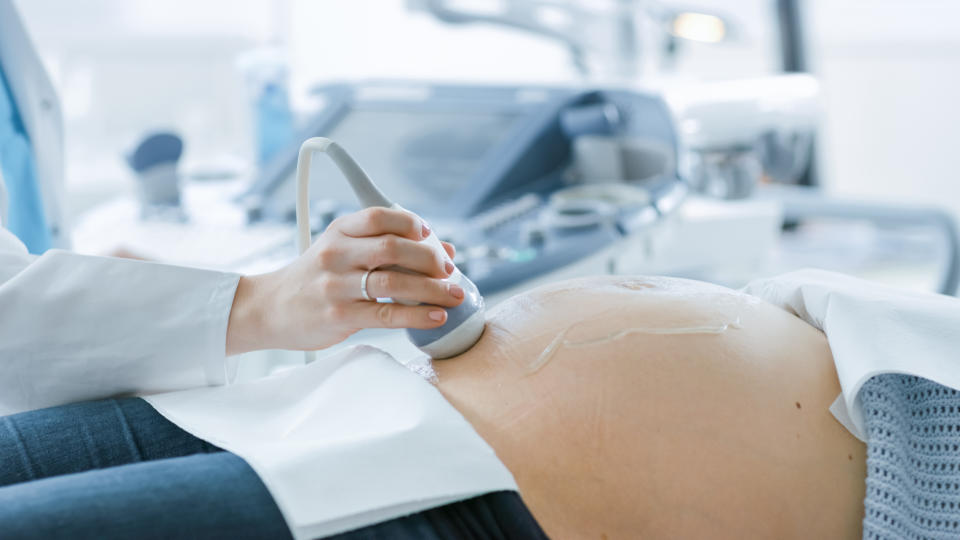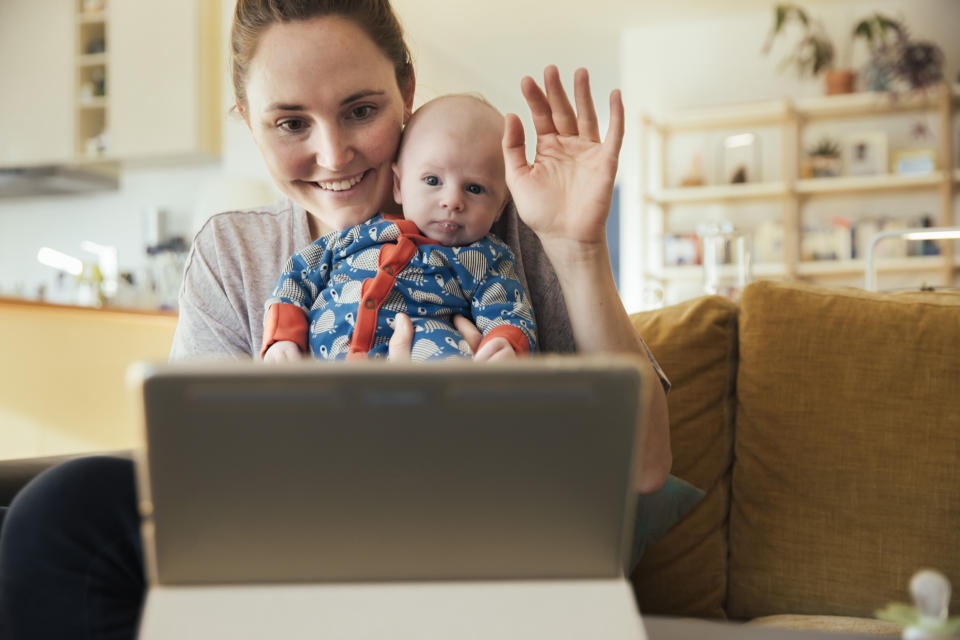Pregnancy and birth care is changing because of coronavirus: here's what you need to know

Melissa Howard, 31, from the Wirral, is 22 weeks pregnant, and due to give birth in the next few months.
While pregnancy usually brings it’s fair share of anxiety, for Melissa, being pregnant in the midst of the coronavirus pandemic has brought with it a whole new set of fears.
Melissa is one of the thousands of mums-to-be across the UK whose experience of pregnancy has been altered by the spread of COVID-19.
Last week, the UK’s public health agencies changed their guidance for pregnant patients, placing them in a vulnerable group and advising the reduction of social contact through social distancing measures.
While the changes are necessary to protect their health, the new rules are understandably causing anxiety and confusion and are having a knock-on effect on pregnancy care and birth plans.
Some health authorities are now asking pregnant women to attend antenatal appointments alone, and in certain hospitals birth partners will no longer be able to visit antenatal and postnatal wards in bid to protect mothers and newborn babies from the spread of coronavirus.
And with reports from New York that some pregnant women will have to give birth without their partners, it is understandable that women in the UK are fearing they could find themselves in a similar position.
So much so that more than 141K people have signed a petition against birthing measures becoming stricter, which could involve some women having no birthing partner at all while they give birth.
“I am starting to mentally prepare myself that I may have to give birth alone,” Melissa, a mindset coach and photographer tells Yahoo UK.
“With this being my first pregnancy, I haven't a clue what to expect and will rely heavily on the support from the midwifery team.
“The uncertainty and fear of actually giving birth is something that won't go away because I don't know what to expect.”
Latest coronavirus news, updates and advice
Live: Follow all the latest updates from the UK and around the world
Fact-checker: The number of COVID-19 cases in your local area
Explained: Symptoms, latest advice and how it compares to the flu

While Melissa is right to prepare herself for every actuation, as it stands at the moment, while visitor guidance has recently been updated, a (single) birth partner accompanying a woman in labour is one of a few exceptions.
Of course, this would be different if your birth partner tests positive for coronavirus or experiences symptoms of it.
“We know this is a really worrying time for pregnant women and having the reassurance of their birth partner is more important than ever,” says Birte Harlev-Lam, Executive Director for Professional Leadership at The Royal College of Midwives.
“If your birth partner does not have COVID-19 or any symptoms, then there should be no barriers to them being with you.
“However, if they DO have COVID-19 or symptoms of it, they won't be able to be at the birth. This is for your and your baby's safety, as well as that of the midwives and maternity staff.
“If it's possible that your birth partner may not be at the birth, start thinking about an alternative birth partners as a back-up. This could be a friend, another family member or a doula.
“This is a new disease, and, as such, we are developing our knowledge quickly, which means the guidance may change. Remember, you can speak to your midwife to discuss your options,” Harley-Lam adds.
Advice for pregnant women at this moment seems to be to speak to your care team about potential changes to your care during pregnancy and birth.
“NHS staff are working round the clock to respond to the biggest global health threat in a generation, while also ensuring that people can still access vital services like maternity care in as safe a way as possible,” an NHS spokesperson tells Yahoo UK.
“This may mean that conversations need to take place between women and their care teams about the best and safest options for their labour, and that there may need to be limits on visitors during labour, though a specific exception can be made if clinical staff also agree it is safe.”

Pregnant in a pandemic
According to Rachel Fitz-Desorgher, retired midwife and baby and parenting expert at The Baby Show unprecedented times calls for unprecedented measures to keep everyone safe.
“In order to ensure that maternity hospitals are kept as infection-free as possible you might find that there are some new rules in place for you if you are pregnant or have just given birth,” she explains.
“Although this might seem worrying for you, it should actually be reassuring - if everyone works together to follow the new guidelines, then your labour and birth is likely to be just the same as it would have been at any other time.”
Should I attend my antenatal appointments?
The RCM and Royal College of Obstetricians and Gynaecologists (RCOG) are advising continuing to attend antenatal appointments. “Attending antenatal and postnatal care when you are pregnant and have a new baby is really important to ensure the wellbeing of you and your baby,” the guidance reads.
“If you are well, you should attend your antenatal care as normal. If you have symptoms of possible coronavirus infection, you should contact your community midwife to postpone routine visits until after the isolation period is over.
“At this time, it is particularly important that you help your maternity team take care of you.”
Can I have my partner or mum with me at the birth?
Midwives know that good support from a chosen birth partner is really important to keeping mums relaxed. So, unless your partner is poorly, you should still be able to have them with you at the labour and birth. However, in order to minimise the risk of infection to everyone, you will be asked to keep birth support to just one person. So, partner or mum but not both.
Can I have my partner with me at my scans?
Current guidance is that if you have a routine scan, appointment or visit due in the coming days, you should contact your maternity unit for advice and a plan.
According to Fitz-Desorgher it is likely that, until government guidance on social distancing is lifted, you will be asked to come alone for your scans and antenatal appointments.
“This can seem very upsetting when you have looked forward to sharing this moment so why not take your phone and live stream a video to your partner during the scan using a good app,” she advises.
“And do remember to record the sound of the heartbeat too to share with family and friends.”
Will I be able to introduce the baby to family after birth?
Under the new guidelines from the UK government, you must not have family gatherings as it simply too risky.
But Fitz-Desorgher advises parents-to-be to take advantage of this by scheduling regular video calls.
She also suggests doing what midwives have always recommended by having a proper ‘Baby Moon’. “Plenty of time to hunker down with your partner for cuddles, chocolates and lots of rest,” she adds.
This is one aspect of being pregnant in a pandemic that Melissa also plans to embrace.
“Personally, I'm glad of this, Coronavirus or not,” she explains. “I have friends and clients who have felt pressurised into seeing visitors directly after birth and I would not like to be in that situation.
“Given the likelihood that the virus is still going to be a public health issue in August, my partner and I plan to provide updates via video to loved ones so to not potentially expose the baby, the medical team or other pregnant women to the virus.”
Read more: One-year-old baby is thought to have coronavirus

Is it safe to give birth in hospital?
Although it is easy to think of hospitals as places where sick people are, maternity hospitals are different, advises Fitz-Desorgher.
“Maternity wards tend to be well isolated from the general hospitals and midwives do not usually work on general wards where sick people are being nursed so maternity wards could well be expected to be the cleanest, and therefore safest, parts of our hospital system,” she says.
“And, of course, staff really understand about good hand-washing and hygiene. There is no reason to think that the maternity wards will be any busier than usual, unlike the general wards, so try to relax, keep yourself isolated and healthy for the last month/s of pregnancy and look forward to finally meeting your little one.”
Will my birth plans have to change?
Apart from not being able to have more than one birth partner, it is unlikely that you will have to change your birth plan.
“If you have planned a home birth then, at the moment, midwives are still able to cover them, and as long as staffing levels remain good enough, you should still be able to use a birthing pool,” Fitz-Desorgher advises.
“As always, make sure to show you midwife your birth plan well in advance of your due date and discuss it with them so that, on your big day, things can go as smoothly as possible.”
In order to help prepare mentally for the prospect of giving birth in a pandemic, Melissa has decided not to make a birth plan.
“A lot can and will change in between now and my due date,” she says. “When the time comes, I will follow the advice of the midwifery/medical team on place of birth and birth methods.I trust them to help me make the right decision for my baby and me.
“Having suffered with anxiety in the past, overthinking can be issue for me. Doing this has also helped me remove personal, family and societal expectations of what I ‘should’ do,” she adds.
“I plan to focus on what I can affect, change and influence and that is my thoughts.”
Will it be safe to breastfeed my baby?
Yes! “In fact, whilst the virus does not pass into your milk, any antibodies you make will,” explains Fitz-Desorgher. “So it is more important than ever that you give your baby your own milk.
“If you are infected it is STILL important to breastfeed to get those vital antibodies into your baby. Be scrupulous about hand-washing before and after feeds, sterilise any pumping kit after every use and, if you are coughing, consider wearing a mask during feeds. If you want to then express your milk and ask someone else to give your milk to your baby until you feel better.”
Hospitals across the UK might vary a little in their local policies so make sure to speak to your own midwife to find out what the rules are for your area.
The RCM's joint information for pregnant women is updated when any guidance changes is on the RCM website at https://www.rcm.org.uk/.



